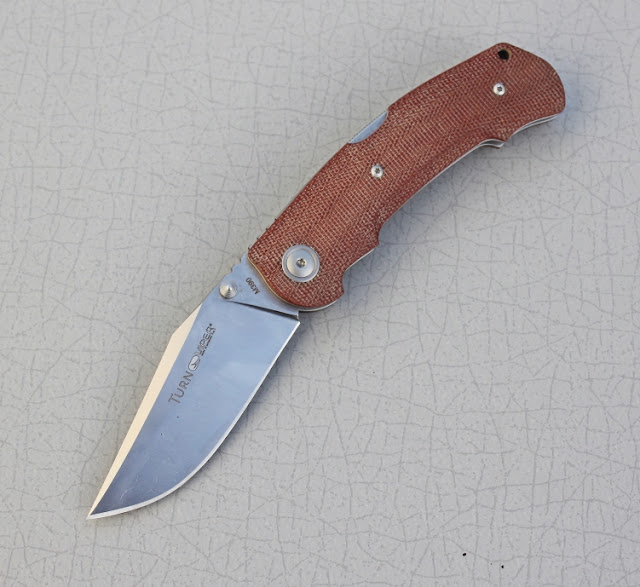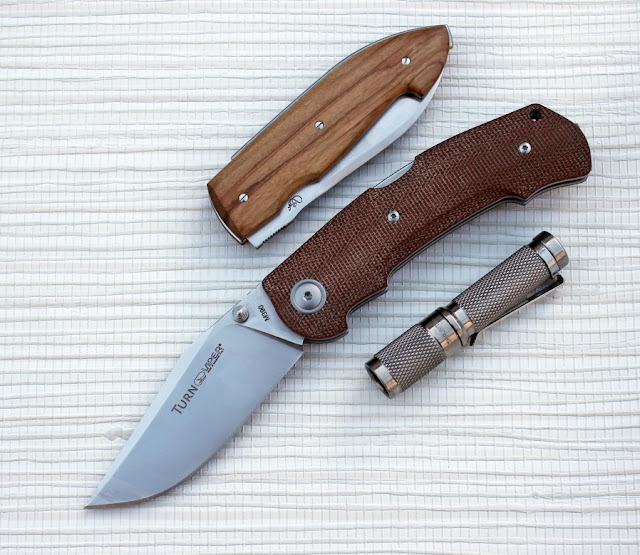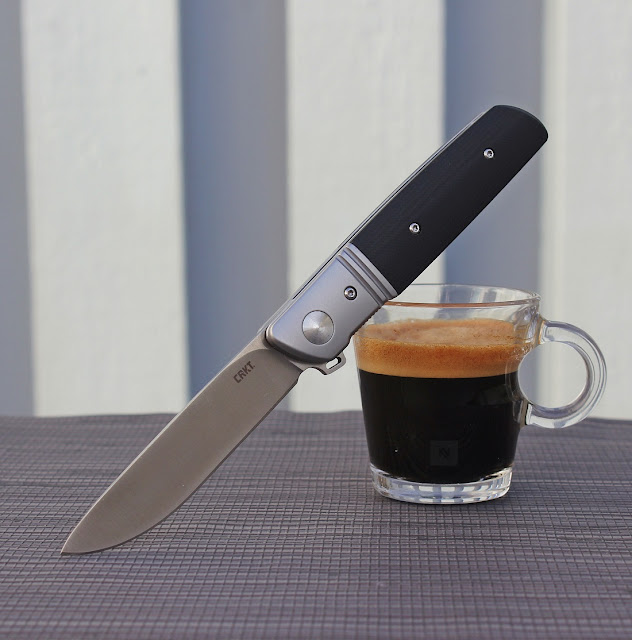- a modern interpretation of a classic that shed skin
Time for a snake again. Specifically, a viper in the form of
Viper Turn Essential. I think it feels like yesterday that I presented a knife from them but that could be because I carry Italian knives quite often.
However, it's actually been a year since I reviewed a knife from the Maniago-based company and it was a fixed-blade hunting/outdoor knife. I haven't reviewed a Viper Knives folding knife since the end of 2021. Therefore, I think it's about time!
 |
| Viper Turn Essential |
This is a fairly new model for 2023. Or that's not quite true. Rather, it is a variation of a knife that has been on the market for a couple of years. If I remember correctly, the original Turn was introduced towards the end of 2020. But it is a knife that has a front bolster, something that is missing from the "Essential" models.
This procedure is something that Viper has practiced for quite some time. First, they release a model, usually with a bolster, then perhaps some luxury version of it with, for example, a pattern welded blade or titanium handle, and then a slightly simpler version of the same knife. Even relatively early models such as Timeless are available in versions with or without bolsters, and the same can be said of, for example, Gent, Key, and Novis. Turn is thus one of the latter to receive that treatment.
Now "basic" or Essential in this case does not mean any direct lowering of the level of either material or build quality. It is the same high finish and cares about the details and the materials are of the highest quality in both blade and handle. Then, of course, the basic form signed by Fabrizio "Silver" Silvestrelli is the same.
 |
| Turn är designad av Fabrizio Silvestrelli |
Twitter version: Viper Turn Essential, modern, and classic in beautiful harmony. A compact and well-built folding knife in top material for the forest walk or perhaps as a sturdy EDC knife.
Blade
Drop point Viper calls this shape. I'm not really inclined to agree. If anything is a quintessential clip point, it's this knife! Especially as the clipped part of the blade is enhanced in terms of appearance with a solid swedge. But of course, if by "drop point" you only mean that the tip is found below the center line of the knife, then that is correct.
The blade is not gigantic but still stable with just over eight centimeters or more precisely 82 mm in length. The height amounts to a maximum of 28 mm and it is matched by a thickness of 3.5 mm.
The marking of the blade consists of the model name and logo on the presentation side of the blade in classic Viper style. It's not something I have any particular opinions about. Those who want to see completely sterile blades, however, have to look away. Steel type is also found on the ricasso of the same side. Silvestrelli's marking is found on the opposite side. The finish is a glossy satin.
 |
| At least I consider this to be a clip point |
The type of steel found in the blade is the one that Viper uses in all their finer knives and it comes from Böhler/Uddeholm and has the now-known designation M390. Steel that at this point does not need much introduction. Without going too deep into technicalities, it is, provided it is not too soft hardened, one of the best steels available for folding knives. In practical terms, it means that it is resistant to rust, takes a very fine edge, and above all, lasts a damn long time. The degree of hardness is stated by Viper as HRC 59-61.
Turn Essential has a very high, in practice completely flat grind. The only flap part is found at the ricasso around the thumb studs. The part of the blade spine that remains after what can most closely be compared to a "harpoon tip" is strongly rounded in the usual Viper fashion. It gives a luxurious feel and is soft to put the thumb against, although the front part of the lock bar and the back of the blade have received a series of well-executed grooves.
 |
| The blade has been given a glossy satin finish |
A sharp blade with a nice flat grind usually bites well in most materials and that also applies in this case. That goes for everyday materials such as cardboard, tape, and plastic packaging of varying thickness and hardness as well as cable ties and nylon straps. The same can be said about tamp and rope.
Then it is noticeable that this is high-end steel as it is fairly durable. Unlike some reviewers, I don't delve too deeply into the details of steel composition. I note more how it appears partly initially and partly over time. Although the latter requires even longer trial periods than in this case.
Knives that are used need to be resharpened after a while anyhow. With M390, you generally don't need to do this very often. Especially not if a knife is used as an "EDC"/pocket knife. They are rarely used for longer periods of time. It's not a professional knife or the like we're talking about.
Handle
It is the very appearance of the handle that is the big and otherwise only difference between "Essential" and the original version of Turn. As mentioned in the introduction, it had a design with a titanium front bolster, which this knife apparently does not have. Instead, a piece of Brown canvas Micarta extends over the entire side of the knife handle. If you don't like that color, there is also black Micarta, which almost looks gray in pictures, and two shades of G10 and carbon fiber to choose from.
 |
| Handle sides in Micarta |
The micarta is of very high quality and also finely executed. In this case, this means that the sides are properly sanded and that they are elegantly arched. Then the frame and sides are well polished but despite that, there are some sharp corners that are more dependent on the design than the execution.
The sides are screwed in place with two small T6 screws with round heads. This a choice I may not be entirely fond of but in return, the screws are of high quality and Viper is still one of the extremely few brands I know that even prints the grade of steel on their screws on the website. In addition to those screws, there is an adjustable pivot screw fitted with a luxurious titanium collar.
The backspacer of this knife is made of polished stainless steel that has been properly rounded. In it and through the sides of the handle is a small hole that acts as a lanyard hole.
The frame is also made of steel and it has not been weight relieved, which together with the lock construction makes the knife somewhat heavier than it should have been. It also shifts the weight towards the handle.
 |
| A very well-built handle, but the edges could have had a stronger chamfer for better ergonomics |
The comfort and ergonomics of this knife are a strange three-step rocket. In the picture and in a quick test, the knife appears to be excellent in that area. The size feels just right, full without being excessive, the sides are, as I said, shaped, the fingers find their places and the back is elegantly curved to fit the hand better.
But in step two, some details are discovered to think about. The first time I held this knife I was actually not excited at all. On the contrary, I experienced several corners as potential problem areas/hot spots. This is applied to both the front and rear "platforms" for the index and little finger, as well as the back edge of the finger guard and the clip. All have distinct terminations in the form of edges. To make sure it wasn't just me, I lent the knife to a good friend who thought much the same. However, expressed a little differently. He is not a knife enthusiast like me.
 |
| The handle works well as long as you don't work for too long and with challenging chores |
Next comes step three, actually using the knife. And then it's perfectly fine again! Certainly all the edges I just listed come to mind. But in some strange way, Turn Essential works anyway. With a normal hammer grip, all four fingers actually find their place and the knife sits securely in the fist. It's just a matter of grasping "carefully" if I can put it that way.
The same applies to an even greater degree if the knife is gripped in a saber grip. Then it is necessary to remove the index fingers a little, a few millimeters back is enough, from the finger guard so that it does not feel uncomfortable. In addition, the back end of the knife with the associated clip must be placed in the right place inside the hand, whereupon the same applies there. The thumb then naturally finds its grooves on the back of the blade and the knife is relatively comfortable to work with.
Possibly, I can imagine that some of these details require less precision for those with smaller hands or if you wear gloves.
But then it should be pointed out that everything I wrote above applies to light use. After all, if you cut wood for a while, the transitions from the handle sides are somewhat too angular. This especially applies to the little finger but also to the thumb. It's not pleasant after a while. Those parts would have needed stronger rounding in order to handle more challenging tasks.
Opening and Lock
Thumb studs are the way to open Turn, if you don't feel like using both hands, of course. The classic style of the knife attracts the latter. It is also very easy as the blade, despite being a back lock, runs on ball bearings. It's not a very common combination. Yet, I might add. But it gives a very smooth action.
 |
| Turn is opened with thumb studs that are found close to the handle |
 |
| The typical pyramid shape gives slightly sharp thumb studs |
The studs are double-sided, which together with the lock construction makes the knife completely ambidextrous as far as those bits are concerned. The thumb studs, well, I'm not quite friends with them. Those who are familiar with luxury knives recognize the shape from, for example, the CRK Sebenza. This means in plain language that they are pyramidal. It certainly gives a very good grip on the thumb, but they are not comfortable for me to use. Especially as in this case, they are placed quite close to the handle.
However, the placement provides enough leverage which, in combination with the bearings, makes the knife easy to open. This is especially true since the resistance to be overcome on this type of knife comes from the back spring and not from a traditional "detent ball".
One way to escape the sharp point, however, is to twist the knife in the hand and instead of placing the thumb on top of the thumb knob, press against the side of it. I felt smart when I figured it out and it makes the Turn much more convenient to open.
 |
| This knife boasts a very good back lock |
The back lock construction on this knife is one of the best I have come across right away. It only gets to see itself beaten by another Italian from a different brand but in the same city. I won't say more. Either way, the lock snaps into place with a reassuring sound and holds the blade rock solid. The small play in the vertical direction that can sometimes be felt in back locks is almost completely non-existent here. The same applies laterally, but there the knife can of course be adjusted if desired. In other words, the feeling is extremely solid.
Releasing the lock is also very easy. The resistance is well-balanced and the lock bar is rounded for increased comfort while also being equipped with some small notches for a better grip.
To Carry
The Turn Essential is a compact little rascal. The combination of a closed back with a back lock and a steel frame leaves its mark. The weight is therefore 125 grams. Not heavy per se, but it's more than you would expect for a knife this size anyway. The construction also affects the balance. The balance point is found right at the second step for the fingers. The knife is thus slightly back-heavy.
 |
| The titanium clip is attached to the rear end of the handle, which gives a so-called "deep carry loop over" clip |
The measures are otherwise not a deterrent in any way. The length of 10.8 cm and the thickness of 1.4 cm certainly make it a little chubby but not excessively so. But sure, you feel like you have a knife in your pocket. It cannot be denied. But that knife does not have sharp edges or corners that disturb the hand if it has to go into the same pocket. Something I appreciate.
 |
| The tension found in this titanium clip is good and the ramp is sufficient |
One of the reasons for that is the eminent clip made of titanium. It is of the "deep carry" type, which means that the knife sits very deep in the pocket. What people think about differs. I belong to those who usually but do not always advocate that type of clip. But there are pros and cons to most solutions. This variety which attaches to the rear end of the handle and then bends forward in a "loop" tends to feel more in the hand when working with a knife. That's the case here with what I've touched on before. But it's not so bad as it usually ends up outside the hand when you grab the knife. In other grips, you have to compromise a bit. If you really want to use the knife for heavier tasks, there is always the option of removing the clip.
Removing the clip works as said, but changing position is not possible, to the detriment of those who are left-handed. The spring in the clip is very good and keeps the knife in a firm grip in the pocket. The ramp is sufficient to work with most fabric edges.
Conclusion
In fact, the first impressions of the Turn Essential, that it is a compact, robust, and well-built knife, stand up even after the honeymoon impressions have passed. It is a solid build, which is reflected in, for example, a good fit between the lock bar/back spacer/frame, nicely rounded blade spine, and arched and well-executed sides. Then it can be added that the action is very smooth and the lock particularly well made. The blade is also well-ground and centered. They know what they are doing in Maniago.
Then, of course, the materials are of the highest standard. It is canvas Micarta, M390 steel, and details such as clip and pivot collar in titanium. Turn Essential is and feels luxurious.
 |
| With the Turn, Viper Knives has succeeded in making a really good back lock knife that also works in an EDC role |
However, all that glitters is not gold. There are things that could be better. Some details have to do with personal preferences and some are choices in the design that can perhaps be discussed. The first is, the concept with thumb studs and a back lock, others may prefer a flipper-opened knife and liner or frame lock. Having said that, it can be stated that if you are to use a classic back lock construction, this is how it should be done. It can't be anything other than top marks on that front.
Other details are more general, such as those related to ergonomics. I've said it before and I'll say it again. There is a danger in shaping a handle this much. Namely, it can limit comfort depending on hand size and shape. In this case, there are a number of edges to consider. They disappear if you wear gloves, but I don't see gloved hands as the most natural in an EDC context, and actually not outdoors either.
Somehow I feel this knife is made for someone with smaller hands than me. Without knowing exactly, I suspect that the average Italian is somewhat smaller than the average person in Sweden. Maybe it's a delusion or not. And then the outer edges should be rounded more if the knife is to be used for outdoor activities. It may look different depending on where you are in the world. But in Sweden, it often means cutting wood in various ways and it can be heavy.
 |
| Viper Turn Essential is a quality knife with a strong personality |
Viper Turn Essential is more of a solid workhorse than a lightweight when we talk about folding knives. But then again, you do find the knife in the "Outdoor & Hunting" section of their website. That's something I agree with. Turn is not overly large and heavy but possibly on the heavier side for most EDC use although that is highly personal as well.
But if that's what you're looking for and you don't have huge hands, this is a luxurious option that I can highly recommend.
Specifications:
Length Overall: 188 mm
Length Folded: 108 mm
Weight: 125 g
Blade Length: 82 mm
Blade Thickness: 3,5 mm
Blade Steel: Böhler M390
Hande : Canvas Micarta
Lock: back lock
Produced by: Viper Knives, made in Maniago, Italien
/ J - may soon have to expand the terrarium



































